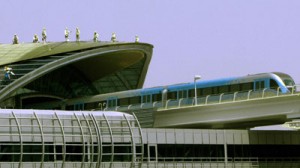Ashish Joshi, Gulf correspondent www.news.sky.com
The Dubai Metro officially opens today but the city’s commuters will have to wait another day before they can take a ride on the £4.5bn transport system.

Its construction has been the emirate’s largest infrastructure project in more than a decade, and an army of overseas workers laboured day and night to meet the deadline.
It is the world’s largest automated driverless train system – with just under 75km of magnetic track.
Peyman Parham Younis, from the Road and Transport Authority, said the line joins together a list of instantly recognisable icons.
“When you talk about Dubai you talk about the seven-star hotel – the Burj Al Arab – or the Palm Island – the first man-made island – or the tallest building in the world – the Burj Dubai,” he said.
“We want the Metro to become a new icon and to connect all of these icons.”
The economic crisis has meant many of Dubai’s major building projects have been postponed or cancelled.
But the Metro is underwritten by the government and has been completed from start to finish in just four years.
But that does not mean it has been free of problems.
The agency that managed the ambitious project has had to defend a budget spike of 75% – with the estimated cost rising from an estimated £2.5bn to about £4.5bn.
The Road and Transport Authority also announced that only 10 of the Metro’s 29 stations would be opened.
It denied allegations of payment disputes with contractors and rejected claims the project needed extra financing to be completed.
Andrew Critchlow, the Dow Jones Gulf bureau chief, thinks the Dubai Metro is a huge gamble for the heavily indebted sheikdom.
“The Metro project is one of the schemes that has been ring-fenced,” he said.
“They have decided to go ahead with it even though the cost has more than doubled since it was first planned.
“All of this is set against the overall debt position that Dubai faces. It is estimated anywhere between $80m and $150m (£48m and £90m).”
The Metro will be able to carry up to 27,000 passengers in each direction every hour.
The carriages boast air conditioning, wi-fi and mobile phone reception while a gold class cabin with leather seats and plush pile carpets offers panoramic views at the front of the train.
But most commuters only care about its congestion-beating ability.
“I’m really excited about the Metro. They say it’s going to be easier, more convenient,” said financial analyst Arif Chhatrisa.
“I’ll be able to reach home in around 15-20 minutes. At the moment it takes me around two hours because I have to take two buses.”
The standard fare is among the lowest in the world – eight times cheaper than a London Tube fare.
While Cairo and Tehran already have metro systems, Dubai’s network is the region’s first mass transport system in more than a decade.
It ensures Dubai’s ambition to be the Middle East’s number one metropolis remains on track.
















